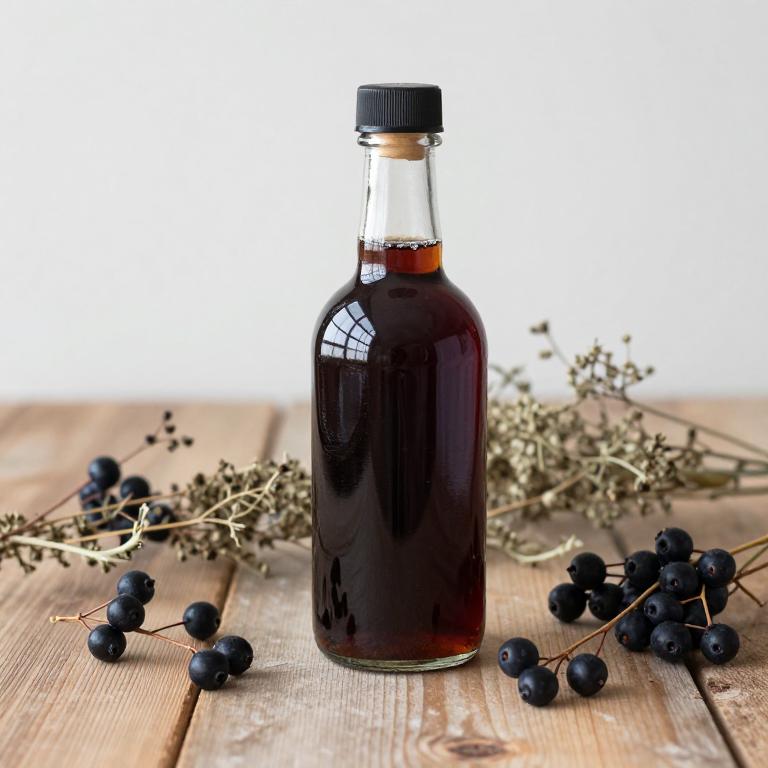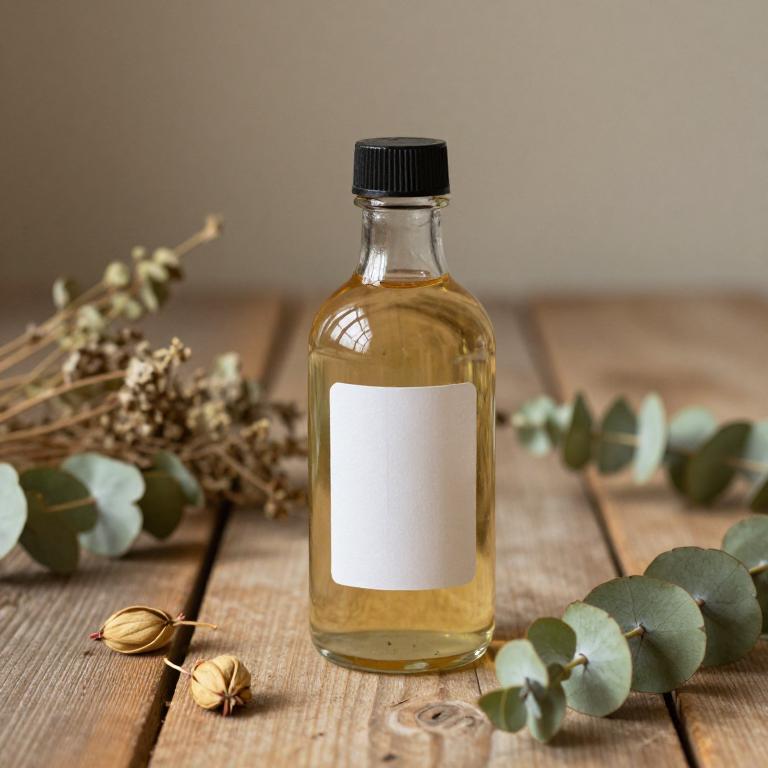10 Best Herbal Syrups For Throat Congestion

Herbal syrups are natural remedies commonly used to alleviate throat congestion by soothing irritated tissues and reducing inflammation.
These syrups often contain ingredients like ginger, echinacea, licorice root, and thyme, which have antimicrobial and anti-inflammatory properties. They can help loosen mucus and ease coughing, making them a popular choice for people seeking relief without harsh chemicals. Many herbal syrups are available in both store-bought and homemade forms, offering a variety of flavors and formulations.
However, it is important to consult a healthcare provider before use, especially for children, pregnant women, or those with underlying health conditions.
Table of Contents
- 1. Licorice (Glycyrrhiza glabra)
- 2. Thyme (Thymus vulgaris)
- 3. Ginger (Zingiber officinale)
- 4. Fennel (Foeniculum vulgare)
- 5. Peppermint (Mentha piperita)
- 6. Salvia (Salvia officinalis)
- 7. Black elderberry (Sambucus nigra)
- 8. Eucalyptus (Eucalyptus globulus)
- 9. Rosemary (Rosmarinus officinalis)
- 10. Chaste tree (Vitex agnus-castus)
1. Licorice (Glycyrrhiza glabra)

Glycyrrhiza glabra, commonly known as licorice root, has been traditionally used in herbal medicine for its soothing effects on the throat.
Licorice root syrup is often formulated to alleviate symptoms of throat congestion due to its expectorant and anti-inflammatory properties. The active compounds, such as glycyrrhizin and flavonoids, help reduce irritation and loosen mucus, making it easier to expel. It is frequently used in cough syrups and respiratory remedies to provide relief from sore throats and coughing.
However, long-term use should be monitored due to potential side effects like hypertension, especially in individuals with pre-existing health conditions.
2. Thyme (Thymus vulgaris)

Thymus vulgaris, commonly known as thyme, is a popular herb used in herbal syrups to alleviate throat congestion due to its antimicrobial and anti-inflammatory properties.
These syrups are often prepared by steeping dried thyme leaves in a simple syrup, creating a soothing and aromatic remedy. Thymus vulgaris herbal syrups are particularly effective in relieving symptoms of coughs, colds, and sore throats by reducing mucus buildup and irritation. The presence of compounds like thymol and carvacrol contributes to its ability to combat respiratory infections naturally.
As a traditional remedy, thyme syrup is widely used in herbal medicine for its comforting effects on the respiratory system.
3. Ginger (Zingiber officinale)

Zingiber officinale, commonly known as ginger, has been traditionally used for its medicinal properties, including its ability to alleviate throat congestion.
Ginger herbal syrups are often formulated with a blend of ginger extract, honey, and other soothing ingredients to provide natural relief from coughing and sore throat. The active compounds in ginger, such as gingerol and shogaol, possess anti-inflammatory and antioxidant effects that can reduce irritation and mucus buildup in the throat. These syrups are particularly beneficial for individuals seeking a natural alternative to over-the-counter cough medicines.
When used as part of a holistic approach to respiratory health, ginger herbal syrups can offer gentle and effective relief from throat congestion.
4. Fennel (Foeniculum vulgare)

Foeniculum vulgare, commonly known as fennel, has been traditionally used in herbal syrups to alleviate throat congestion due to its expectorant and anti-inflammatory properties.
The essential oils in fennel, particularly anethole, help to loosen mucus and reduce irritation in the respiratory tract. These syrups are often prepared by combining dried fennel seeds with honey or other natural sweeteners to enhance palatability and therapeutic effects. They are particularly beneficial for individuals suffering from coughs, colds, or bronchitis, as they promote easier breathing and soothe sore throats.
However, it is important to consult a healthcare professional before using fennel-based syrups, especially for children or those with existing medical conditions.
5. Peppermint (Mentha piperita)

Mentha piperita, commonly known as peppermint, is often used in herbal syrups to alleviate throat congestion due to its soothing and decongestant properties.
These syrups typically contain a concentrated form of peppermint oil, which helps to reduce inflammation and ease the discomfort of a sore or irritated throat. The menthol in peppermint acts as a mild stimulant, promoting mucus drainage and improving breathing by clearing the airways. Many people find relief from persistent coughs and throat irritation by using these natural remedies, especially when combined with other herbal ingredients like eucalyptus or thyme.
However, it is important to consult with a healthcare professional before use, particularly for children or individuals with existing medical conditions.
6. Salvia (Salvia officinalis)

Salvia officinalis, commonly known as sage, is often used in herbal syrups to alleviate symptoms of throat congestion due to its anti-inflammatory and antimicrobial properties.
These syrups typically combine sage with other soothing ingredients like honey or ginger to enhance their effectiveness in reducing coughing and irritation. The essential oils in sage, particularly thujone and camphor, help to loosen mucus and ease breathing, making it a popular remedy for respiratory discomfort. When used as a natural alternative to over-the-counter medications, sage-based syrups offer a gentle and potentially safer option for individuals seeking relief from mild throat congestion.
However, it is important to consult a healthcare professional before using these syrups, especially for children or those with existing health conditions.
7. Black elderberry (Sambucus nigra)

Sambucus nigra, commonly known as the European elderberry, is often used in herbal syrups to alleviate throat congestion due to its antiviral and anti-inflammatory properties.
These syrups are typically made by combining dried elderberries with honey, ginger, and other soothing ingredients to create a comforting and effective remedy. The high concentration of antioxidants in elderberries helps reduce inflammation and soothe irritated throat tissues. Many people use these syrups as a natural alternative to over-the-counter cough medications, especially during cold and flu season.
However, it is important to consult a healthcare provider before using elderberry syrups, especially for children, pregnant women, or individuals with chronic health conditions.
8. Eucalyptus (Eucalyptus globulus)

Eucalyptus globulus, commonly known as eucalyptus or gum tree, is a popular herb used in herbal syrups to alleviate throat congestion.
These syrups typically contain eucalyptus oil, which has natural decongestant and antiseptic properties that help reduce inflammation and soothe irritated throat tissues. The aromatic compounds in eucalyptus globulus work to loosen mucus and improve respiratory airflow, making it beneficial for individuals suffering from colds, coughs, or bronchitis. When used as a throat syrup, it can provide relief from soreness and discomfort associated with respiratory infections.
However, it is important to consult a healthcare professional before use, especially for children or individuals with allergies or chronic health conditions.
9. Rosemary (Rosmarinus officinalis)

Rosmarinus officinalis, commonly known as rosemary, is often used in herbal syrups to alleviate throat congestion due to its anti-inflammatory and decongestant properties.
These syrups typically combine rosemary with other soothing ingredients like honey, eucalyptus, or thyme to enhance their effectiveness. The aromatic compounds in rosemary help to open up the airways and reduce mucus buildup, providing relief from coughing and sore throat. Herbal syrups made from rosemary are a natural alternative for those seeking to manage mild respiratory symptoms without pharmaceuticals.
When used as part of a holistic approach, these syrups can support the body's natural healing processes and promote clearer breathing.
10. Chaste tree (Vitex agnus-castus)

Vitex agnus-castus, commonly known as chasteberry, has been traditionally used in herbal medicine for its potential soothing and anti-inflammatory properties.
When formulated into a herbal syrup, it may help alleviate throat congestion by reducing inflammation and mucus production in the respiratory tract. This natural remedy is often recommended for mild to moderate throat irritation and is considered safe for most adults when used as directed. The syrup's mild taste and easy absorption make it a convenient option for those seeking natural relief from throat discomfort.
However, it is important to consult with a healthcare provider before use, especially for individuals with existing medical conditions or those taking other medications.